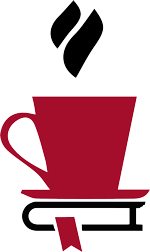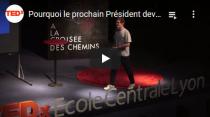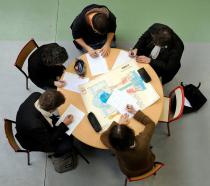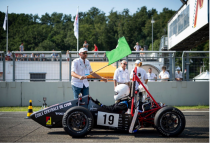Once an engineer embarks on their professional career, they soon find themselves involved in project-based work. By educating the engineering student through projects, the student is placed in a position similar to what they will later encounter, while still being able to rely on the structured supervision of an educator.
Project activities are scattered throughout the entire engineering programme in both the core and elective subjects.
The introduction to this type of work occurs with a Study Project and is then augmented by an Applied Project that gives students greater freedom and responsibility. Activities undertaken by the Piston Motorsport Club (EPSA) and the Ethics Cafés offer students the chance to take part in more ambitious projects and to see their tangible results.
Study Projects (PE)
In 1st year, students are given a scientific or technical problem that is within the institute’s areas of expertise.
Students are supervised by faculty members in everything concerning the management of the project, engineering subjects and human and social sciences. These members comprise a science tutor, a communications adviser and an adviser in project management. Partner companies and research laboratories may also cooperate with the teaching staff in setting the topics.
The objectives of the study project are to:
- confront a complex problem with no one particular solution
- manage a team project
- research information and develop skills
- set up the necessary resources
- obtain results without necessarily being successful (the activity’s focus is on the educational value)
- become proficient in written and oral communication
Contact
Clotilde Minfray
Associate professor of materials science (CNU 33)STMS/LTDS
Applied Project (PA)
In 2nd year, students choose one of three different types of projects:
- The Applied Study Project (PAe) extends the first-year type of project to a more complete end result.
- The Applied Industrial Project (PAi) allows second-year students to take on an industrial-type project with all its inherent complexity and sophistication. It is generally on a topic (technical, market analysis or monitoring) defined by a sponsoring company and undertaken under its supervision. Students are supported by an adviser who guides them through the seven-month duration of the project.
- The Applied Research Project (PAr) gives the student their first individual taste of research with personal supervision in one of the institute’s laboratories.

Among the Applied Projects are the Ethics Cafés, a space for exchanges and reflection.
The Ethics Cafés are organised around a debate between engineering students and two speakers with opposing views on a given subject. They take place on a Wednesday from 12:30pm to 2pm, six times a year. Besides the scientific and technical debates, the goal is to make students reflect on the ethical issues of problems that they may be faced with in their future careers. Finance, nuclear energy, weapons, pseudo-sciences, female entrepreneurship and even industrial espionage are some topics that have already been dealt with in these meetings.
Here is the list of Ethics Cafés - more information available from Laure Flandrin.

TEDx Centrale Lyon is another possible Applied Project. TED is a non-profit devoted to spreading ideas. TED talks bring together the most fascinating thinkers and people in the world, who give a presentation of their life in under 18 minutes. Elon Musk, Sheryl Sandberg and even former US president Bill Clinton have given talks for TED. TEDx is an independently organised local event. Centrale Lyon’s TEDx is led by a group of students as part of an Applied Project.
Contact
Vincent Gantès
Partnerships and Prospecting Division OfficerCorporate relations and development office
- +33 4 72 18 67 11
- Email contact form
Specialisation Project (PO)
In 3rd year, the specialisation options include a 50-hour project forming part of the educational activities of the student’s chosen specialisation.





